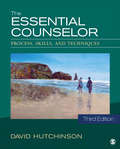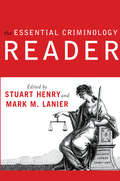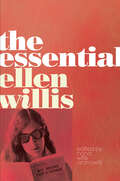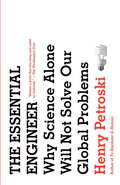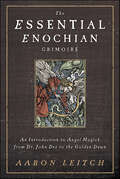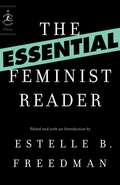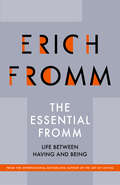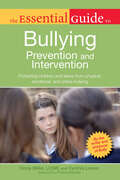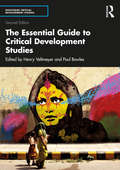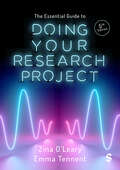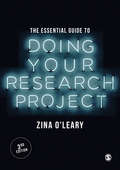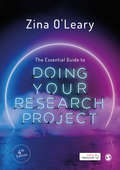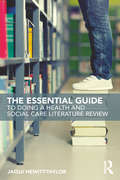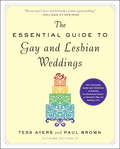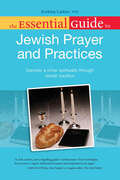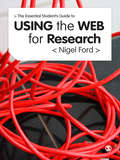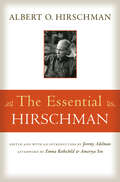- Table View
- List View
The Essential Counselor: Process, Skills, and Techniques
by David R. HutchinsonWritten with a warm, engaging, and passionate spirit, the Third Edition of David R. Hutchinson’s The Essential Counselor comprehensively reveals the process of becoming a counselor from start to finish. Emphasizing the importance of the therapeutic alliance, this practical book provides budding and experienced counselors with real-world examples, reflection activities, and skill-building exercises that challenge and promote the critical thinking skills necessary to thrive in professional counseling environments. The fully updated Third Edition is rich with case studies and features video demonstrations of key skills needed when working with clients.
The Essential Criminology Reader
by Stuart HenryInitially designed to accompany Mark Lanier and Stuart Henry's best-selling Essential Criminology textbook, this new reader is an up-to-date companion text perfect for all students of introductory criminology and criminological theory courses. The Essential Criminology Reader contains 30 original articles on current developments in criminological theory. Commissioned specifically for The Reader, these short essays were written by leading scholars in the field. Each chapter complements one of 13 different theoretical perspectives covered in Lanier and Henry's Essential Criminology text and contains between two and three articles from leading theorists on each perspective. Each chapter of The Reader features: a brief summary of the main ideas of the theory the ways the author's theory has been misinterpreted/distorted criticisms by others of the theory and how the author has responded a summary of the balance of the empirical findings the latest developments in their theoretical position policy implications/practice of their theory
The Essential Ellen Willis
by Ellen WillisOut of the Vinyl Deeps, published in 2011, introduced a new generation to the incisive, witty, and merciless voice of Ellen Willis through her pioneering rock music criticism. In the years that followed, Willis&’s daring insights went beyond popular music, taking on such issues as pornography, religion, feminism, war, and drugs. The Essential Ellen Willis gathers writings that span forty years and are both deeply engaged with the times in which they were first published and yet remain fresh and relevant amid today&’s seemingly intractable political and cultural battles. Whether addressing the women&’s movement, sex and abortion, race and class, or war and terrorism, Willis brought to each a distinctive attitude—passionate yet ironic, clear-sighted yet hopeful. Offering a compelling and cohesive narrative of Willis&’s liberationist &“transcendence politics,&” the essays—among them previously unpublished and uncollected pieces—are organized by decade from the 1960s to the 2000s, with each section introduced by young writers who share Willis&’s intellectual bravery, curiosity, and lucidity: Irin Carmon, Spencer Ackerman, Cord Jefferson, Ann Friedman, and Sara Marcus. The Essential Ellen Willis concludes with excerpts from Willis&’s unfinished book about politics and the cultural unconscious, introduced by her longtime partner, Stanley Aronowitz. An invaluable reckoning of American society since the 1960s, this volume is a testament to an iconoclastic and fiercely original voice.
The Essential Engineer: Why Science Alone Will Not Solve Our Global Problems
by Henry PetroskiFrom the acclaimed author of The Pencil and To Engineer Is Human, The Essential Engineer is an eye-opening exploration of the ways in which science and engineering must work together to address our world&’s most pressing issues, from dealing with climate change and the prevention of natural disasters to the development of efficient automobiles and the search for renewable energy sources. While the scientist may identify problems, it falls to the engineer to solve them. It is the inherent practicality of engineering, which takes into account structural, economic, environmental, and other factors that science often does not consider, that makes engineering vital to answering our most urgent concerns.Henry Petroski takes us inside the research, development, and debates surrounding the most critical challenges of our time, exploring the feasibility of biofuels, the progress of battery-operated cars, and the question of nuclear power. He gives us an in-depth investigation of the various options for renewable energy—among them solar, wind, tidal, and ethanol—explaining the benefits and risks of each. Will windmills soon populate our landscape the way they did in previous centuries? Will synthetic trees, said to be more efficient at absorbing harmful carbon dioxide than real trees, soon dot our prairies? Will we construct a &“sunshade&” in outer space to protect ourselves from dangerous rays? In many cases, the technology already exists. What&’s needed is not so much invention as engineering.Just as the great achievements of centuries past—the steamship, the airplane, the moon landing—once seemed beyond reach, the solutions to the twenty-first century&’s problems await only a similar coordination of science and engineering. Eloquently reasoned and written, The Essential Engineer identifies and illuminates these problems—and, above all, sets out a course for putting ideas into action.
The Essential Enochian Grimoire: An Introduction to Angel Magick from Dr. John Dee to the Golden Dawn
by Aaron LeitchDiscover how to perform Enochian magick with a straightforward guide that shows just what to do. The Essential Enochian Grimoire is an easy-to-read manual that's light enough to carry in a magickal circle yet provides all the details you need to perform the ceremonies. Impeccably researched and clearly organized, this book is the definitive primer on a topic that has captivated esotericists for centuries.Explore the history of Enochian cosmology, the angels and the spirits of the system, the temple setup, and the making and usage of the tools. Learn the secrets of John Dee's classical Enochian system as well as the modern system developed by the Golden Dawn. Practice the rituals of the new and the old...and summon the angels who guard the gates of heaven.Praise:"Aaron Leitch has done a remarkable job of clarifying the Enochian system for the benefit of both beginners and advanced magicians alike. You will not find a better introduction to Enochian magick anywhere."—Chic and Tabatha Cicero, Chief Adepts of the Hermetic Order of the Golden Dawn and co-authors of The Essential Golden Dawn"In the complex and often confusing world of Enochian magick, Aaron Leitch has accomplished the seemingly impossible by bringing clarity and precision while never oversimplifying or speaking down to the reader."—Donald Michael Kraig, author of Modern Magick"An indispensable addition to any Enochian magician's bookshelf."—Frater Yechidah, author of Enochian Magic in Theory
The Essential Feminist Reader
by Estelle B. FreedmanThe Essential Feminist Reader is the first anthology to present the full scope of feminist history. Prizewinning historian Estelle B. Freedman brings decades of teaching experience and scholarship to her selections, which span more than five centuries. Moving beyond standard texts by English and American thinkers, this collection features primary source material from around the globe, including short works of fiction and drama, political manifestos, and the work of less well-known writers. Freedman's cogent Introduction assesses the challenges facing feminism, while her accessible, lively commentary contextualizes each piece. The Essential Feminist Readeris a vital addition to feminist scholarship, and an invaluable resource for anyone interested in the history of women.
The Essential Fromm
by Erich Fromm Rainer FunkAs Fromm points out, ours is "a life between having and being"--between mere having and healthy being, between destructiveness and creativity, between narcissism and productive self-understanding, between passivity and the joy of positive activity. The alternatives of having and being are basic orientations of our character and determine our behavior. The mostly unpublished and unknown texts featured in The Essential Fromm encapsulate Fromm's views on the fulfilling life. To put down roots yet remain free is what the late Erich Fromm called the art of being. It is the secret of happiness.
The Essential Guide to Building Your Argument (Student Success)
by Dave RushStruggling to know why arguments are important at university? Unsure about what an argument is, how they work, or how to produce one? Then you have come to the right place! Covering both written and verbal arguments, this practical guide will demystify academic conventions. It will show you what an argument is and how it works, providing you with a framework for producing great arguments of your own. Student Success is a series of essential guides for students of all levels. From how to think critically and write great essays to boosting your employability and managing your wellbeing, the Student Success series helps you study smarter and get the best from your time at university.
The Essential Guide to Building Your Argument (Student Success)
by Dave RushStruggling to know why arguments are important at university? Unsure about what an argument is, how they work, or how to produce one? Then you have come to the right place! Covering both written and verbal arguments, this practical guide will demystify academic conventions. It will show you what an argument is and how it works, providing you with a framework for producing great arguments of your own. Student Success is a series of essential guides for students of all levels. From how to think critically and write great essays to boosting your employability and managing your wellbeing, the Student Success series helps you study smarter and get the best from your time at university.
The Essential Guide to Bullying: Prevention And Intervention (Essential Guide)
by Cynthia Lowen Cindy MillerHeadlines are filled with tragic stories of senseless murders and suicides that have resulted from child and teen bullying. As social networking and technology add to the ways that kids can be bullied, parents feel powerless against this insidious force that compels even "good" kids to participate in or enable bullying in schools, in extracurricular activities, online, and at home. The Essential Guide to Bullying Prevention and Intervention brings together the wisdom and experience of two people who have witnessed bullying's causes and tragic effects. School social worker Cindy Miller teams with Cynthia Lowen, the co-creator of Bully, to arm parents and teachers with the knowledge they need to: • Understand the societal and human forces that are causing bullying to escalate. • Discover who is most at risk for being bullied, being a bully, or not helping a bullying victim. • Target-proof their kids and teach them coping skills. • Identify even the most covert bullying situations. • Infiltrate the world of cyberbullying and head off its disastrous effects. • Intervene to stop a bullying situation. • Know what legal recourse they have to back up other anti-bullying efforts.
The Essential Guide to Caring for Aging Parents: A Wise and Practical Guide to Navigating the Complex World of Family Elder Care (Essential Guide)
by Dr. Linda RhodesAs the elderly live longer and health care becomes more complex and expensive, the personal and financial burden placed on families attempting to care for an aging parent is greater than ever. Dr. Linda Rhodes has decades of experience in assisting families to navigate this often treacherous road; and she has her own personal story to tell. This mix of professional wisdom and warm personal insight makes The Essential Guide® to Caring for Aging Parents the perfect guide for anyone in need of an authoritative yet supportive voice to help an elderly parent not only live with dignity, but thrive. Dr. Rhodes shares with readers loads of advice garnered from her years as the Secretary of Aging for the state of Pennsylvania, as well as her own personal story of dealing with her parents' situation, often over long distances.
The Essential Guide to Critical Development Studies (Routledge Critical Development Studies)
by Henry VeltmeyerThe Essential Guide to Critical Development Studies provides an up-to-date and authoritative introduction to the field, challenging mainstream development discourse and the assumptions that underlie it. Critical development studies lays bare the economic, political, social, and environmental crises that characterise the current global capitalist system, proposing instead systemic change and different pathways for moving beyond capitalism into a new world of genuine progress where economic and social justice and ecological integrity prevail. In this book, the authors challenge market-driven, neoliberal development agendas, incorporating analyses of class, gender, race, and the dynamics of uneven capitalist development. This thoroughly revised and expanded second edition includes: • 18 new chapters, including on topics such as philanthrocapitalism, race, the energy transition, Indigenous resistance and resilience, and global health • Expanded global coverage, including new chapters on South Africa, North Africa, and the Gulf Arab states • A new section on resistance and alternatives • Additional pedagogical features, including a glossary of key terms, discussion questions, and expanded guides for further reading. This textbook will be essential reading for students of global development, political science, sociology, economics, gender studies, geography, history, anthropology, agrarian studies, international political economy, and area studies. It will also be an important resource for development researchers, practitioners, and policymakers.
The Essential Guide to Doing Your Research Project
by Zina O′Leary Emma TennentDoing a research project or dissertation can be daunting. This practical book will help you dive straight in, driving each step of the process with confidence. Packed with features to support your learning, this guidebook gives you invaluable advice at each stage, from picking a topic, designing your study and navigating ethics to collecting and analysing data then sharing your findings. This fifth edition Empowers you to be critical and self-reflective when consuming and doing research, with 19 critical thinking challenges. Equips you with the skills to make good decisions, prepare effectively, and take charge of your own project. Draws on case studies of real-world research to inspire your creativity and curiosity. This popular, down-to-earth guide is a must-have for undergraduate and postgraduate students embarking on research projects across the social sciences.
The Essential Guide to Doing Your Research Project
by Zina O′Leary Emma TennentDoing a research project or dissertation can be daunting. This practical book will help you dive straight in, driving each step of the process with confidence. Packed with features to support your learning, this guidebook gives you invaluable advice at each stage, from picking a topic, designing your study and navigating ethics to collecting and analysing data then sharing your findings. This fifth edition Empowers you to be critical and self-reflective when consuming and doing research, with 19 critical thinking challenges. Equips you with the skills to make good decisions, prepare effectively, and take charge of your own project. Draws on case studies of real-world research to inspire your creativity and curiosity. This popular, down-to-earth guide is a must-have for undergraduate and postgraduate students embarking on research projects across the social sciences.
The Essential Guide to Doing Your Research Project
by Zina O'LearyThis highly readable text guides the reader through each stage of their research project, from getting started to writing up, with each chapter clearly explaining a step along the way. Based on the author’s hugely popular The Essential Guide to Doing Research, this new book retains the warmth, wit and grounded nature of the first, while providing tools to help students through the ins and outs of their own projects, and addressing the key questions students need to tackle. This is an inspiring book full of down-to-earth advice, illuminating figures, and diagrams and engaging real life examples. With this book as your personal mentor, a successfully completed research project is well within reach.
The Essential Guide to Doing Your Research Project
by Zina O'LearyLecturers, request your electronic inspection copy here. The ultimate companion to successfully completing your research project, the author guides you through a step-by-step approach to research and provides all of the skills and momentum you need to excel. Each stage of a project is clearly set out with best practice highlighted alongside pragmatic advice for tackling research in the real world. The Third Edition uses multidisciplinary case studies, and examples from the author’s own experience, to answer your questions and support your progress as you move smoothly through each stage. With a new chapter on mixed methods approaches, more on disseminating research, more on the practical and legal implications of ethics and more international examples, the book is packed full of learning features and tools to support your journey, including: A fully-developed website with podcasts, videos, journal articles and examples of real projects Activities and worksheets to help you organize your time Learning objectives to sustain your momentum Top tips relating to key research skills Full glossary to test understanding and provide definitions Annotated further reading to help you move through the literature ‘Excuse me, I have a question!’ feature to answer common questions. Warm, innovative and clever, this book is packed full of must-have information for anyone doing a research project.
The Essential Guide to Doing Your Research Project
by Zina O'LearyLecturers, request your electronic inspection copy here. The ultimate companion to successfully completing your research project, the author guides you through a step-by-step approach to research and provides all of the skills and momentum you need to excel. Each stage of a project is clearly set out with best practice highlighted alongside pragmatic advice for tackling research in the real world. The Third Edition uses multidisciplinary case studies, and examples from the author’s own experience, to answer your questions and support your progress as you move smoothly through each stage. With a new chapter on mixed methods approaches, more on disseminating research, more on the practical and legal implications of ethics and more international examples, the book is packed full of learning features and tools to support your journey, including: A fully-developed website with podcasts, videos, journal articles and examples of real projects Activities and worksheets to help you organize your time Learning objectives to sustain your momentum Top tips relating to key research skills Full glossary to test understanding and provide definitions Annotated further reading to help you move through the literature ‘Excuse me, I have a question!’ feature to answer common questions. Warm, innovative and clever, this book is packed full of must-have information for anyone doing a research project.
The Essential Guide to Doing Your Research Project
by Zina O′LearyThis practical book sets out how to approach each stage of your research project, from choosing a research design and methodology to collecting and analysing data and communicating your results – and showcases best practice along the way. Packed with pragmatic guidance for tackling research in the real world, this fourth edition: Offers support for diving into a project using digital data, with how-to guidance on conducting online and social media research Empowers you to confidently disseminate your work and present with impact Helps you map out your research journey and put a plan in place with decision trees in every chapter Challenges you to be reflective and critical about the research you consume and undertake Zina O′Leary′s detailed and down-to-earth approach gives you the research skills and momentum you need to successfully complete your research project.
The Essential Guide to Doing Your Research Project
by Zina O′LearyThis practical book sets out how to approach each stage of your research project, from choosing a research design and methodology to collecting and analysing data and communicating your results – and showcases best practice along the way. Packed with pragmatic guidance for tackling research in the real world, this fourth edition: Offers support for diving into a project using digital data, with how-to guidance on conducting online and social media research Empowers you to confidently disseminate your work and present with impact Helps you map out your research journey and put a plan in place with decision trees in every chapter Challenges you to be reflective and critical about the research you consume and undertake Zina O′Leary′s detailed and down-to-earth approach gives you the research skills and momentum you need to successfully complete your research project.
The Essential Guide to Doing a Health and Social Care Literature Review
by Jaqui Hewitt-TaylorThis step-by-step guide takes the reader logically through the process of undertaking a literature review, from determining when this methodology might be useful, through to publishing the findings. It is designed particularly for students undertaking a dissertation using literature review methodology. However, it also caters to practitioners who wish to review the existing evidence in order to develop practice. Key features of the text include: a chapter on what makes a good literature review, so that readers are clear and confident about what they’re aiming for; discussion of the value of literature reviews, whether for fulfilling the requirements of a course or for developing practice; a chapter structure that reflects the structure of a typical dissertation by literature review, making the material intuitive and easy to navigate; case examples throughout to illustrate how methodological principles work in practice; a troubleshooting guide to provide support and advice on common problems when carrying out a literature review; advice on the dissemination of findings. Written by an established author with significant experience teaching and supervising students doing literature reviews, this invaluable text offers systematic and insightful advice on all aspects of literature review methodology, from problem identification to synthesizing information to forming conclusions. It is ideal for any student or practitioner in health and social care looking to undertake a literature review for study or practice purposes.
The Essential Guide to Gay and Lesbian Weddings
by Paul Brown Tess AyersAn updated edition of the classic planner, “a chatty, humorous compendium of traditions, advice, and wedding details geared for same-sex couples” (Publishers Weekly). Wedding planning is never easy—but for gay and lesbian couples, it presents unique challenges. On top of watching the budget and wrangling your family, you may be wondering: How should we word the invitations? Who can perform the ceremony? What should we say to those who ask, “ . . . why?” This trusty guide—first published when legal same-sex marriage was just a dream—tackles all that and more. Here are tips on finding the perfect venue, vows, outfits, cake, kit, and caboodle, as well as: Creative workarounds (Have you considered a home wedding?)Budget-friendly shortcuts (Supplement the tiered cake with a sheet cake.)The latest trends (How to buck the traditions that don’t work for you.)And sage wisdom, with a wink! (Rule #1: If you invite them, they may come!) If you’d rather stay crazy about each other than go crazy, The Essential Guide to Gay and Lesbian Weddings—filled with “witty, wise, and practical advice”—is for you (Library Journal). “All you need is love—and this book—to have a great wedding.” —Melissa Etheridge, musician and LGBT activist
The Essential Guide to Jewish Prayer and Practices (Essential Guide)
by Andrea LieberAn insightful and illuminating guide to Judaism's basic tenets and practices. The Essential Guide to Jewish Prayer and Practices offers a more profound understanding of Judaism-for practicing Jews and non-Jews alike-by explaining the key concepts of Jewish thought, including the sanctity of human life, Judaism's concept of God, and the role of the Torah in guiding Jewish spiritual life. Judaic studies scholar Andrea Lieber introduces readers to the form of Jewish prayer-the structure of Jewish worship and the different kinds of prayers that make up Jewish liturgy. The perfect guide for Jewish spirituality for affiliated and non- practicing Jews as well as people of other faiths Provides essential knowledge of the meaning of the Torah and the rituals of worship and prayer
The Essential Guide to Using the Web for Research
by Nigel FordThis book will be vital reading for anyone doing research, since using the web to find high quality information is a key research skill. It introduces beginners and experts alike to the most effective techniques for searching the web, assessing and organising information and using it in a range of scenarios from undergraduate essays and projects to PhD research. Nigel Ford shows how using the web poses opportunities and challenges that impact on student research at every level, and he explains the skills needed to navigate the web and use it effectively to produce high quality work. Ford connects online skills to the research process. He helps readers to understand research questions and how to answer them by constructing arguments and presenting evidence in ways that will enhance their impact and credibility. The book includes clear and helpful coverage of beginner and advanced search tools and techniques, as well as the processes of: @!critically evaluating online information @!creating and presenting evidence-based arguments @!organizing, storing and sharing information @!referencing, copyright and plagiarism. As well as providing all the basic techniques students need to find high quality information on the web, this book will help readers use this information effectively in their own research. Nigel Ford is Professor in the University of Sheffield′s Information School.
The Essential HBO Reader (Essential Readers in Contemporary Media and Culture)
by Gary R. Edgerton and Jeffrey P. JonesEssays on the history of HBO, a company designed to please audiences instead of advertisers, and the impact of its distinctive programming: “Recommended.” —ChoiceThe founding of Home Box Office in the early 1970s—when it debuted by telecasting a Paul Newman movie and an NHL game to 365 households in Wilkes-Barre, Pennsylvania—was a harbinger of the innovations that would transform television as an industry and a technology in the decades that followed. HBO quickly became synonymous with subscription television—and the leading force in cable programming.Over decades, it’s grown from a domestic movie channel to an international powerhouse with a presence in over seventy countries. It is now a full-service content provider with a distinctive brand of original programming, famed for such landmark shows as The Sopranos and Sex and the City. It’s brought us Six Feet Under and The Wire, Band of Brothers and Angels in America, Curb Your Enthusiasm and Def Comedy Jam, Inside the NFL and Real Sports with Bryant Gumbel, Taxicab Confessions and Autopsy, and multiple Oscar-winning documentaries.The Essential HBO Reader brings together an accomplished group of scholars to explain how HBO’s programming transformed the world of television and popular culture, and provides a comprehensive and compelling examination of HBO’s development into the prototypical entertainment corporation of the twenty-first century.“An important assessment of the original programming HBO has created in the past few decades?how these programs are derived and what impact they have had.” —Choice“A thorough treatment of HBO’s programming . . . a useful addition to a growing number of books about American television in the ‘post-network’ era.” —American Studies
The Essential Hirschman
by Albert O. HirschmanSome of the finest essays in the social sciences, written by one of the twentieth century's most influential and provocative thinkers The Essential Hirschman brings together some of the finest essays in the social sciences, written by one of the twentieth century's most influential and provocative thinkers. Albert O. Hirschman was a master essayist, one who possessed the rare ability to blend the precision of economics with the elegance of literary imagination. In an age in which our academic disciplines require ever-greater specialization and narrowness, it is rare to encounter an intellectual who can transform how we think about inequality by writing about traffic, or who can slip in a quote from Flaubert to reveal something surprising about taxes. The essays gathered here span an astonishing range of topics and perspectives, including industrialization in Latin America, imagining reform as more than repair, the relationship between imagination and leadership, routine thinking and the marketplace, and the ways our arguments affect democratic life. Throughout, we find humor, unforgettable metaphors, brilliant analysis, and elegance of style that give Hirschman such a singular voice.Featuring an introduction by Jeremy Adelman that places each of these essays in context as well as an insightful afterword by Emma Rothschild and Amartya Sen, The Essential Hirschman is the ideal introduction to Hirschman for a new generation of readers and a must-have collection for anyone seeking his most important writings in one book.
